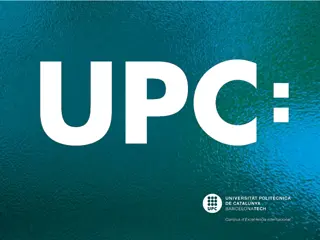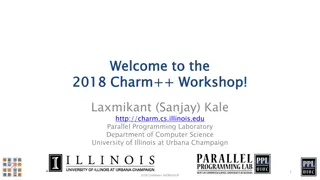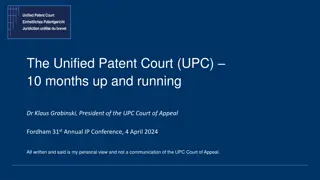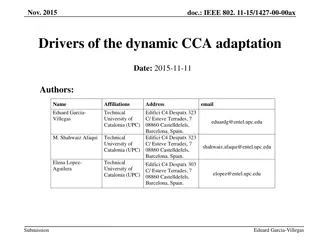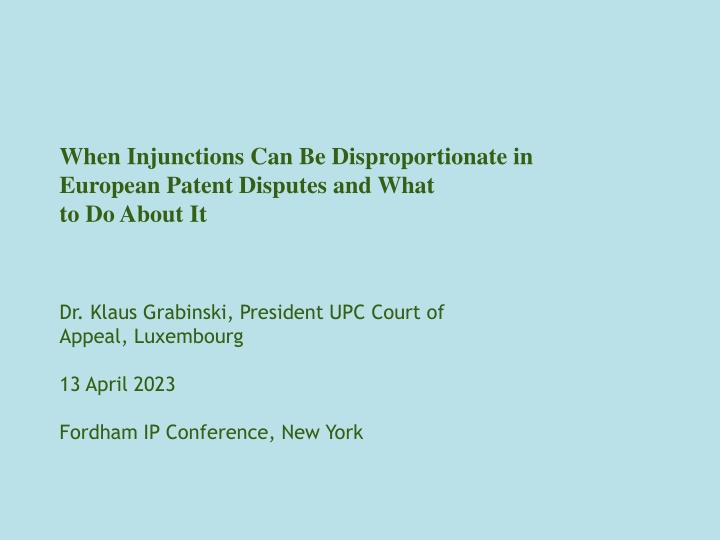
Disproportionate Injunctions in European Patent Disputes
Explore the concept of disproportionate injunctions in European patent disputes, focusing on the right to prevent patent use, permanent injunctions, proportionality, burden of proof, and more. Discover insights from Dr. Klaus Grabinski, President of the UPC Court of Appeal in Luxembourg, presented at the Fordham IP Conference in New York.
Download Presentation

Please find below an Image/Link to download the presentation.
The content on the website is provided AS IS for your information and personal use only. It may not be sold, licensed, or shared on other websites without obtaining consent from the author. If you encounter any issues during the download, it is possible that the publisher has removed the file from their server.
You are allowed to download the files provided on this website for personal or commercial use, subject to the condition that they are used lawfully. All files are the property of their respective owners.
The content on the website is provided AS IS for your information and personal use only. It may not be sold, licensed, or shared on other websites without obtaining consent from the author.
E N D
Presentation Transcript
When Injunctions Can Be Disproportionate in European Patent Disputes and What to Do About It Dr. Klaus Grabinski, President UPC Court of Appeal, Luxembourg 13 April 2023 Fordham IP Conference, New York
Caveat All that is said in the following are only considerations of mine. They do not commit the UPC in any way.
I. Right to prevent the direct and indirect use of a patent
The patent is an exclusive right to use the invention. Pursuant to Art. 25, 26 UPCA a patent confers on its proprietor the right to prevent any third party from directly or indirectly using the patent.
II. Permanent injunction
Art. 63(1) UPCA provides that where a decision is taken finding an infringement of a patent, the Court may grant an injunction against the infringer Since Art. 25 and 26 UPCA confer a right to prevent the direct and indirect use of the patent, Art. 63(1) UPCA should be understood to mean that a finding of patent infringement generally results in the granting of an injunction.
III. Proportionality
Art. 3(2) Directive 2004/48/EC (Enforcement Directive) provides that measures shall .. not only be effective and dissuasive but also proportionate. The enforcement of an injunction is disproportionate when it causes an extra hardship to the patent infringer or a third person that is not justified by the exclusive right and the regular consequences of its enforcement.
It is a recognized principle of procedural law (see UPC Rules of Procedure) that the burden of proof is on the party that relies on a fact. It follows from this principle that the patent infringer has the burden to present and, if contested, prove facts that the injunction would cause an extra hardship to him or a third person.
V. What could possibly be such an extra hardship?
The injunction would make unavailable a medical product (medicament, heart valve, etc.) for patients which has therapeutic properties in the treatment of serious disease which other products available do not have (see Ewards Lifesciences/Boston Scientific Scimed [2017] EWHC 405 (Pat); BGH, IIC 1997, 242 Interferon-Gamma, IIC 2018, 94 Raltegravir; IIC 2020, 278 Alirocumab) or infrastructure relevant for the functioning of society. prevent the marketing of a complex product under particular circumstances. Some circumstances that might be of relevance: the patented invention concerns only a minor functionality, even after a proper fto analysis defendant could reasonably not become aware of the patent, the injunction would have an important effect on the entire business operation of the defendant(see BGH, GRUR 2016, 1031 heat exchanger, denied).
As it is the extra hardship caused to the patent infringer or the third party that makes the enforcement of an injunction disproportionate (only) the extra hardship must be avoided. This can be achieved by suspending the enforceability of the injunction for a certain period of time to allow, in case of a medical product with therapeutical properties, another medical product with the same therapeutical properties to become available on the market or to allow, in case of a complex product with a patent infringing minor functionality, the defendant to either design around or to acquire a license for this functionality.
Only in very exceptional cases proportionality will require a complete denial of injunctive relief. As a rule, defendant should be obliged to pay damages for the continued use of the patent when the enforceability of the patent has been suspended.

